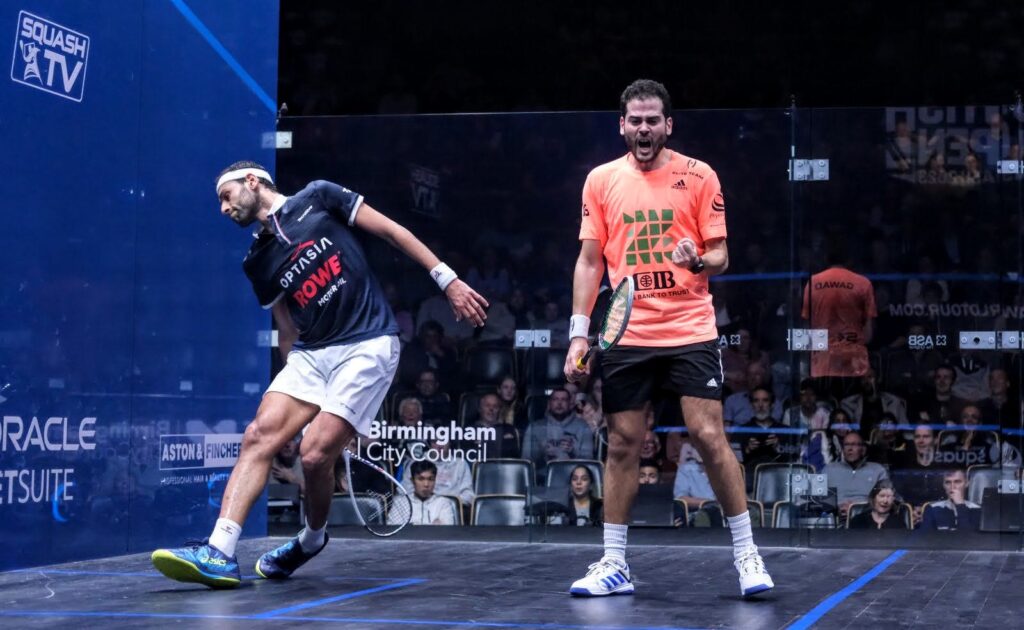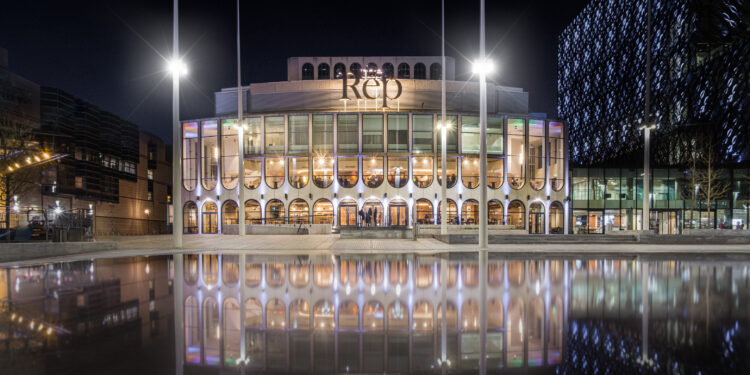It was entirely appropriate that ‘The Gladiator’, Sarah-Jane Perry, produced the moment of the day at the British Open yesterday as the event moved to a theatre whose exterior resembles ancient Rome’s Colosseum.
Turning to face the crowd on stage at the Birmingham Rep on match ball, the local heroine made full use of the theatrical setting as she gestured to the crowd for a response. Like a bloodthirsty Roman rabble, they duly obliged, cheering as if she’d slain a particularly ferocious tiger as she went on to claim victory.
This was just the kind of experience I had hoped to enjoy when I received an impromptu invite to attend the third day of squash’s second most prestigious tournament.
As an avid Squash TV viewer, I was an armchair squash fan. Would seeing the action up close and personal really add anything?
The British Open: King Lear or one-star flop?
As a part-time reporter on the sport through my Squash IQ website, I was more than aware that squash is currently on trial after months of antics that have dogged the men’s game.
So it was a good opportunity for the sport to showcase itself on a real stage on Tuesday as the British Open moved from the traditional courts of Edgbaston Priory to a glass court hastily erected at the 1,000-capacity venue in the centre of the city.
There in the flesh with my squash-playing friend, would I witness a one-star melodrama that’s as poorly attended as it is reviewed, or a kick-arse production of King Lear starring Patrick Stewart and Judi Dench?
Placing myself in the role of a theatrical reviewer, here are my four key takeaways:
1. A drama without the play-acting

Fortunately, the play acting that has beset the men’s game in recent months was nowhere to be seen as I watched the drama unfold from row H.
Instead, I saw a sport with ball-in-play times and player camaraderie most other sports could only dream of.
Mazen Hesham and Baptiste Masotti went at each other like two trigger happy but honourable gunslingers at the O.K. Corral, with the first decision I clocked not coming until the fourth game. In the end, it was Masotti who was shot full of holes as Hesham advanced to the quarter-finals.
If Mohamed Elshorbagy was devastated after missing the chance to regain world number one status when he lost to Karim Abdal Gawad in five, he didn’t show it after the match as he shared a warm embrace with his old rival.
The Ali Farag-Mohamed Elsherbini match was alone in containing a degree of needle, which Farag intimated after the game is down to the duo’s long rivalry. An irritable Farag complained several times about Elsherbini’s use of the towel, while the latter was unhappy with the manner in which Farag requested a change of ball.
But the on-court banter between the duo only added to the drama.
2. Plot twists worthy of the Mouse Trap
Viewers of West End play The Mousetrap are famously instructed after its conclusion never to divulge the plot twist.
But I’m giving nothing away when I say the biggest twist of the day was – albeit inadvertently – produced by Mohamed Elshorbagy’s shock loss to Gawad. The result will catapult Diego Elias to world number one on Monday – however deep the Peruvian goes in the tournament – making him the first South American to hold that status.

That match also extended a second twisty plotline as Gawad – arguably the game’s greatest talent since Ramy Ashour – continued his remarkable rebound from injury. Having been wheelchair-bound for four months less than a year ago, the ‘Baby-Faced Assassin’ is now seven games unbeaten following his triumph at the Optasia Open.
Gawad did not thank compere Michael Absalom in the post-match Q&A when he reminded him that Elshorbagy had won their previous seven encounters.
3. Squash’s big beasts enter stage left
Even from the centre of row H, squash legends including Nick Matthew and Gregory Gaultier were clearly visible as they posed for photos and signed autographs by the theatre entrance.
As a guest of Dunlop, who were celebrating 100 years in business at the event, I also witnessed this duo reflect on why they had chosen to stay in the game following their recent retirements. Matthew now runs an academy for over 60 juniors, while Gaultier works with a trio of top players in the shape of Tinne Gillis, Nour El Sherbini and Mohamed Elshorbagy (who Q&A host Rob Owen joked would be sacking him in the morning).
Owen made the point that these two legends had opted to stay in the sport not for money, but for their passion for the game.
4. A truly global cast
The British Open may have been held at the Birmingham Rep theatre, but perhaps ‘The Globe’ would have been a more appropriate venue given the variety of nationalities taking to court.
The 16 players on display on the first day of last-16 matches on Tuesday represented eight different countries (Egypt, US, England, France, Spain, Hong Kong, New Zealand and Belgium) spanning five continents (North America, Europe, Asia, Africa and Australasia). And the new men’s world number one hails from South America.
In a quirk that can surely only help its future Olympic bids, the game remains dominated by the Egyptians, some of whom are playing the event while observing daylight fasting for Ramadan.
World number seven Tarek Momen revealed that he is staying up until 4.45am to cram in the carbohydrates and then sleeping until 1pm, as he balances the rigours of pro sport with respecting his religion’s customs.
“Ramadan is a tricky customer,” Momen confided following his win over Iker Pajares Bernabeu.
“I actually never played a tournament before during Ramadan. When you are playing dehydrated, the conditions are not ideal. You may get injured. But I’m fighting for my spot in the rankings,” Momen added.
A critic’s verdict
Momen’s post-match interview was the final act in an epic nine-hour, eight-match performance at The Rep.
The parallel version of myself sitting at home taking in the tournament from my couch would have missed out on all the subtleties of the game and on-court dynamics documented above.
And at home, I certainly wouldn’t have had the pleasure of seeing John Massarella plonk himself down next to me and my friend as he enjoyed a break from refereeing (“is this row H”?)
Crucially, the atmosphere at the famous Birmingham theatre on Tuesday had the electricity to match an opening night of MacBeth.
So from this critic, a five-star review or emperor’s thumbs up (depending on which metaphor works best for you).
The only question I was left mulling during the three-hour journey back to Essex, was why this great sport isn’t more widely appreciated beyond the hundreds of fans there in person and thousands more watching on Squash TV.
But nothing adding the odd chained tiger to the proceedings wouldn’t solve…!










